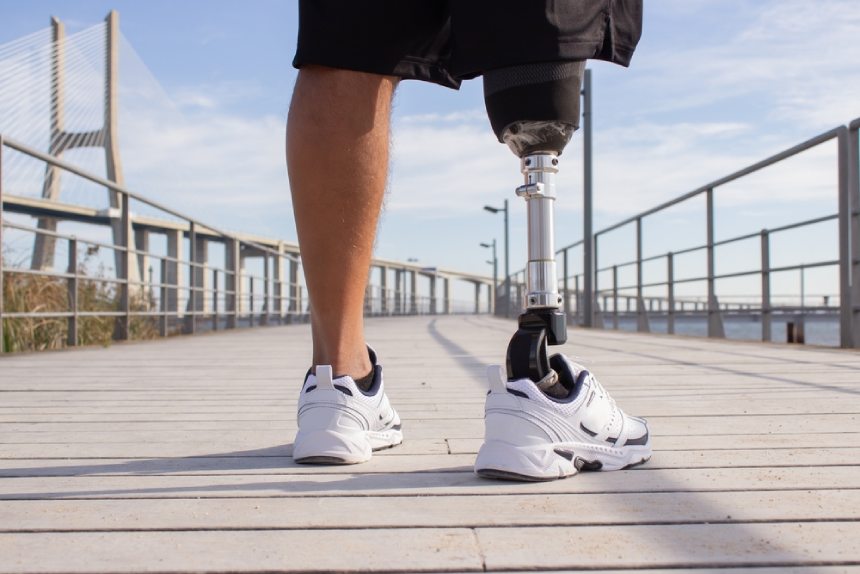Limb loss is one of the most significant injuries a person can sustain. Not only is it emotionally devastating, but it can severely impact a victim’s quality of life. It’s also heartbreaking for the victim’s family – after all, no one wants to see a loved one seriously injured.
In all cases, life is never quite the same. And victims deserve compensation for the harm they’ve endured. At the May Firm, our loss of limb injury attorneys can help you get the damages you deserve.
While you should call us for a case review, here’s an overview of your legal rights after an amputation injury.
What Is a Limb Loss Injury?
A limb loss injury, or amputation injury, means the complete or partial removal of a limb.
“Limbs” include all appendages, from small body parts such as toes through to large body parts such as legs. Victims can suffer a single amputation of one body part, or multiple amputations meaning they lose various body parts.
Surgical vs. Traumatic Limb Loss Injuries
There are, generally, two types of limb loss injuries: surgical and traumatic.
- Surgical limb loss: Surgical amputation or removal of a body part. This procedure may be necessary after an accident, or to manage an underlying medical condition.
- Traumatic limb loss: Losing a body part following trauma or an accident. The limb is forcibly removed from the body.
Our loss of limb injury lawyers in California can explain the differences in more detail.
Classifications of Limb Loss Injuries
Every catastrophic or limb loss injury is unique. However, we can categorize amputation injuries depending on the injury severity.
- Partial amputation: Some structural tissue, such as muscle, tendons, or ligaments, remains attached.
- Complete amputation: The limb is completely severed and there is no connective tissue remaining.
Complete limb loss injuries are typically more serious and traumatic than partial injuries. However, it all depends on the complexity of the structure(s) involved.

Doctors may also group amputations into two categories: upper and lower extremity amputations.
Upper Limb Loss
Any amputation affecting an upper body limb, such as:
- Amputation at hand or wrist level
- Above elbow amputation
- Below elbow amputation
- Amputation at shoulder level
Lower Limb Loss
These amputation injuries affect the lower limbs and include:
- Toe, foot, heel, and ankle amputations
- Amputations below, through, or above the knee
- Hip level amputation
- Total leg and partial pelvic amputation
The more extensive the limb loss, the more severe the injury. Your loss of limb injury attorney can explain how injury classification may affect your claim.
Limb Loss Accidents and Causes
There are many reasons why limb loss injuries occur. However, such injuries often occur due to a serious accident. For example, high-speed collisions, or accidents involving heavy machinery, increase the risk of traumatic amputations.
Common causes of limb loss injuries include:
- Car accidents
- Accidents at work
- Construction site accidents
- Workplace explosions
- Electrocution accidents
- Motorcycle accidents
- Heavy truck collisions
Limbs may be completely or partially severed during the accident. Or, they may be so severely damaged, or crushed, that surgical removal is necessary. Other injuries that often accompany limb loss include:
- Back and spinal cord injuries
- Internal bleeding
- Organ damage
- Broken bones and fractures
- Head trauma
- Burn injuries
- Cuts and lacerations
Some injuries are so severe that the victim dies from their wounds. Our wrongful death attorneys want to help if you lose a loved one through an amputation injury. Contact us today to discuss your case.
Short and Long-Term Consequences of Losing a Limb
A catastrophic injury such as an amputation is debilitating. The impact carries over into every aspect of the victim’s life. It also affects their loved ones. In fact, loss of limb injuries have serious short and long-term consequences.
Short-Term Consequences
- Acute trauma, grief, and distress
- Potential medical complications e.g. wound infections
- Lost wages and time off work
- Phantom limb unwanted sensations and pain
- Acute medical care and physical therapy treatments
Long-Term Consequences
- Inability to return to work, or to return to the same job as before
- Social withdrawal from family and friends
- Ongoing, long-term medical care
- Difficulty adjusting to a prosthetic limb
- Anxiety, depression, and other mood disorders
- Post-traumatic stress disorder (PTSD)
- Loss of body confidence and self-esteem
Given how serious these consequences can be, it’s crucial to understand what legal rights you might have.
Loss of Limb Injury: Your Legal Rights in California
Amputation injury victims may be able to file a civil lawsuit and/or claim workers’ compensation benefits. Your legal rights depend on where the accident occurred and whether anyone else’s negligence caused your injury. Let’s consider both routes to compensation in more detail.
Personal Injury Compensation
You have a legal right to pursue compensation or damages if someone else’s negligence caused your injuries. To succeed, you must show that:
- Another person owed you a duty of care e.g. an employer
- The person breached this duty e.g. knowingly providing an unsafe working environment
- You lost a limb in an accident
- The other person’s negligence caused your loss of limb injury
If you can prove negligence, then you may be able to claim economic damages such as:
- Lost wages
- Medical bills
- Rehab costs
- Therapy fees
You might also claim non-economic damages such as for pain and suffering and emotional trauma.
Damages are hard to quantify, but the May Firm knows how to accurately value any limb loss claim.
Loss of Limb Workers’ Compensation and Benefits
If you lose a limb due to a workplace accident, you might claim workers’ compensation benefits. These benefits compensate you for losses such as wage loss and, sometimes, loss of future work opportunities.

The benefits you can claim vary depending on factors such as:
- The body part lost
- The impact on your ability to work
- Your age
For example, say you’re an older construction worker. You lose a whole limb and can’t work anymore. You might be eligible for more benefits than, say, a young worker who loses a smaller limb but can still work.
You can normally only claim a certain portion of your wages for a specific number of weeks. However, some victims may be eligible for lifetime payments, depending on their injury.
If someone else caused your injury, you can also claim personal injury damages. However, you can’t file a civil lawsuit if no one is to blame. Your attorney can explain what options are open to you based on your case.
How to Make a Personal Injury Claim for Limb Loss Injuries
If you’re injured due to someone else’s negligence, you can file a personal injury claim. The exact process varies, depending on your unique case. However, the main steps are as follows:
- Seek immediate medical attention following your injury. You need urgent evaluation, especially if there’s severe bleeding. If the limb is still intact, keep it safe and take it to the ER with you. It is sometimes possible to reattach an amputated limb.
- If possible, identify witnesses. They may have pictures or videos of the accident scene. They could also confirm what happened e.g. if a speeding driver caused a crash which injured you.
- If the accident happened at work, report it immediately. The incident must be recorded so it can be actioned properly.
- Keep anything you can lose as evidence e.g. proof of lost income or medical bills. Such evidence will help your attorney value the claim accurately.
- Contact a personal injury attorney without delay. They can determine if you have a claim, gather the relevant evidence, and build the strongest case in your favor.
Statute of Limitations
If you have suffered an amputation injury, you only have so much time to file a civil lawsuit. This is down to a law known as the “statute of limitations”.
Every state has different time limits for personal injury claims. In CA, you only have two years from the accident date to file a claim. Some exceptions may apply if, for example, a minor is involved. In most cases, though, the two-year rule applies.
Have you been injured? Call a California loss of limb injury lawyer as soon as possible. Not only will this help you preserve vital evidence, but it will reduce the chances of you missing the claims deadline.
How a Loss of Limb Injury Attorney Can Help
Loss of limb injury claims are inherently complex. That’s why seeking legal advice is so beneficial. However, if you’re still unsure whether to hire an injury attorney, here’s why it’s a good idea.
- Injury attorneys understand how to properly value your claim and determine how much it could be worth. Where possible, they will help you hold the parties responsible for your injuries to account.
- Amputation injury lawyers are experienced in dealing with insurance companies. They understand how to negotiate, and they will fight to secure you the fairest possible deal.
- A loss of limb injury lawyer can help you access the ongoing treatment you need to manage your injury.
- Catastrophic injury cases do, sometimes, proceed to trial. If your case goes to trial, an experienced attorney can present a compelling case in your favor. They will walk you through the process so that it’s less overwhelming.
Our loss of limb injury attorneys treat clients like family. Whatever support and legal guidance you need, we’re here to help.
California Loss of Limb Injury Lawyers
Limb loss is heartbreaking. It changes your life forever. If you’ve suffered a catastrophic injury, at work or elsewhere, the May Firm wants to hear about it.
As an experienced amputation injury firm, we know how much your accident can affect your quality of life. And while no amount of money can make up for what happened, you deserve compensation for your pain and suffering.
It’s our passion, and privilege, to help you get justice.
Our personal injury lawyers are always here to help. All initial meetings are free, and we don’t charge anything unless we win your case. You have nothing to lose and no reason to delay!
Contact the amputation injury team to discuss your case and explore your legal options.
Disclaimer: The content in this article is provided for general informational purposes only and may not represent the current law in the recipient’s jurisdiction. The article should not be interpreted as professional legal advice from The May Firm or the individual author, nor is the information intended to substitute for legal counsel on any subject matter. The article, nor any of the information included, should not be used to act or refrain from acting without seeking the appropriate legal or other professional advice from a lawyer licensed in the recipient’s jurisdiction. Any reliance you place on such information is strictly at your own risk.



